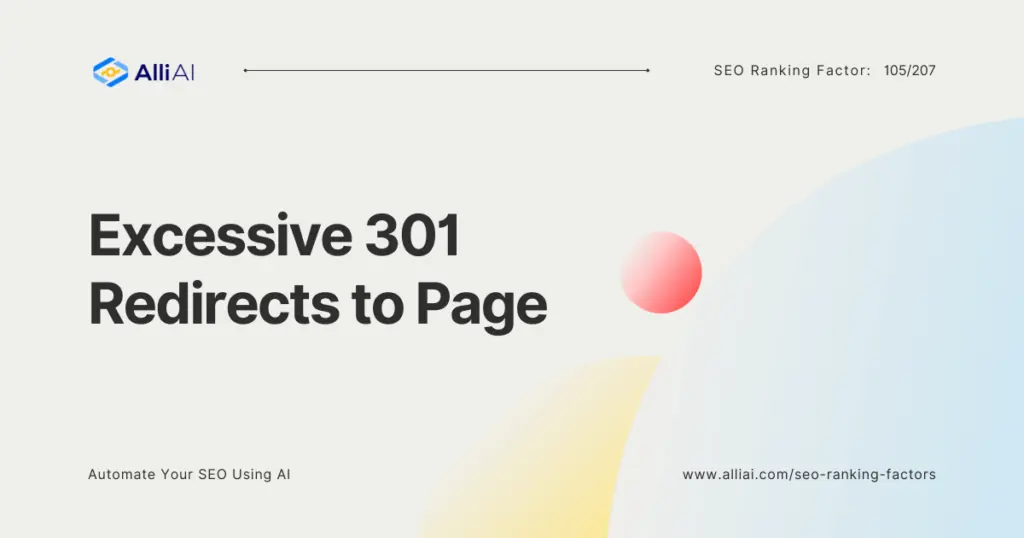Explanation of Excessive 301 Redirects as a Ranking Factor
In the labyrinth of SEO (Search Engine Optimization), a 301 redirect is akin to the signposts in a vast city directing traffic towards the correct destination. These redirects are permanent road signs that inform search engines and users that a page has permanently moved to a new location. However, just like in a city, an excessive number of signposts can lead to confusion, slow down the traffic, and affect the overall journey experience. Similarly, excessive 301 redirects can dilute the potency of SEO efforts by potentially slowing down site speed, dispersing link equity, and complicating the pathway that search engines use to crawl a site.
Imagine you’re trying to drive to a friend’s new house, but to get there, you must follow a series of detour signs. One detour leads to another, and then another, creating a longer and more complex route. Each detour sign, akin to a 301 redirect, directs you to the next point, but the excessive number of detours can be frustrating, time-consuming, and inefficient. This scenario mirrors how excessive 301 redirects can complicate a website’s navigational structure, making it harder for both users and search engines to reach the intended destination efficiently.
Why is Excessive 301 Redirects Important in SEO?
Excessive 301 redirects are a crucial factor in SEO for several reasons. Primarily, they can significantly impact a website’s user experience. Delays in page loading times due to too many redirects can frustrate users, increasing bounce rates and reducing the chances of conversion. Furthermore, search engines prioritize websites that offer a smooth, fast, and user-friendly experience. A site riddled with unnecessary redirects may, therefore, be deemed less favorable by search algorithms, negatively impacting its ranking.
A series of studies underscore the significance of website speed and simplicity in user experience and SEO outcomes. For instance, Google’s “Speed Update” explicitly incorporated mobile page speed as a ranking factor for mobile searches. According to Google, the probability of bounce increases by 32% as page load time goes from 1 second to 3 seconds.
Another study by Backlinko found a direct correlation between site speed and Google rankings across thousands of domains. Regarding redirects, excessive 301 redirects insert additional HTTP request-response cycles, increasing page load time. This elongation of the loading process can negatively impact search engine visibility and user experience, leading to lower SERP positions and decreased traffic.
How Excessive 301 Redirects Affect SEO
Relevant Stats
FAQ
How many 301 redirects are considered ‘excessive’?
The term ‘excessive’ is subjective; however, it’s wise to limit the use of 301 redirects to those that are absolutely necessary. As a rule of thumb, try to ensure that no link requires more than two redirects to reach its final destination.
Can 301 redirects affect my site’s loading speed?
Yes, 301 redirects can adversely affect your site’s loading speed. Each redirect introduces an additional HTTP request-response cycle, potentially delaying the page load time and impacting user experience.
Are there any SEO-friendly alternatives to excessive 301 redirects?
Yes, whenever possible, update links to point directly to the final destination instead of passing through redirects. Additionally, use 301 redirects sparingly and strategically, focusing on maintaining a streamlined site architecture that enhances user experience and site performance.
Conclusion
Excessive 301 redirects serve as a crucial factor in the realm of SEO, bearing significant implications for site performance, user experience, and ultimately, search engine rankings. Like unnecessary detours on a road trip, they can complicate the journey, leading to frustration and inefficiency. By understanding their impact and implementing strategies to minimize their use, website owners and SEO professionals can pave the way for smoother journeys through their digital domains, ensuring both search engines and users reach their intended destinations quickly and effortlessly.






